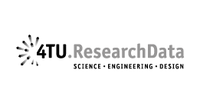More and more faculties work interdisciplinarily and there is an increasing need to view datasets from different angles. The expertise of data managers is necessary in many types of research and the best way for managing data shouldn’t have to be reinvented at an individual research project level all the time. A certain uniformity in data management and in offering access to data cannot be avoided. We must keep up with international initiatives such as FAIR. | Chantal Kemner
In this section we show, as an inspiring example of data support, how RDM Support from Utrecht University set up a pool of data managers.
Interview, June 2019
Research Data Management Support (RDM Support) offers the research community at Utrecht University a flexible pool of competent and experienced data managers. A data manager can be hired and embedded in a research project, part-time or full-time, for a limited, very specific task, such as assistance with writing a data management plan, or for a longer period of time, for example to set up the data flow and data infrastructure.
The five-legged sheep
Martine Pronk, head of Academic Services at the University Library at Utrecht University, shares her considerations to set up the service of embedded data managers:
"We realised that the demands in the different phases of the research cycle are so diverse that finding all the expertise in one person is comparable to searching for the well-known five-legged sheep. Hiring people from outside the university is expensive and requires training, and when their task is completed, they take their expertise with them. I used my background in agency work to set up a flexible, internal pool of data managers who temporarily support one or more projects and also complement each other in expertise. The expertise built up in this way remains within the university."
Each data manager has general knowledge and expertise in RDM, is an active member of the global RDM community and follows the latest developments in a dynamic area, such as new policies and regulations, development of new data infrastructures and new tools for data management. At Utrecht University, the data managers are active participants in the RDM support network and rely on the expertise of colleagues, such as privacy and security experts, data consultants or data engineers.
"When recruiting our data managers, specific attention was paid to personal competencies that contribute to the success of the pool", Martine explains. "The data manager in question is responsible for creating his or her own job and must have the willingness and flexibility to work on different projects simultaneously or in succession".
Smooth transition
"Because we are highly educated and experienced in the academic environment, we can quickly place ourselves in the context of a new project", adds Lena Karvovskaya, one of the pool's data managers. "Of course, we cannot have discipline-specific knowledge for every discipline at the Utrecht University. That means that for a scientific project a choice has to be made between hiring a data manager or hiring a PhD / postdoc who does have discipline-specific knowledge but may not have specific training in RDM ".
Lena gives some examples: "EPOS, a project in geosciences funded by the European Commission, had as its main objective the development of an infrastructure for sharing research data. EPOS needed a metadata expert and hired one of the data managers from the pool. A general understanding of metadata schemes and data exchange was more important than specific knowledge of geosciences. And YOUth, a large-scale data collection project that follows children from conception to early adulthood, needed a daily data manager who would ensure proper storage and access to research data".
Lena believes that the flexibility of the pool of data managers is the strongest asset of this service: "A data manager can be contacted again for possible follow-ups and if the same data manager is not available, another data manager from the pool will ensure a smooth transition".
Precious data
Prof. Chantal Kemner, programme director of the Utrecht YOUth cohort, uses the services of two of the pool's data managers: Ron Scholten and Danny de Koning. "The embedded data management service from RDM Support is an essential service. More and more faculties work interdisciplinarily and there is an increasing need to view datasets from different angles. The expertise of data managers is necessary in many types of research and the best way for managing data shouldn’t have to be reinvented at an individual research project level all the time. A certain uniformity in data management and in offering access to data cannot be avoided. We must keep up with international initiatives such as FAIR", says Chantal, stressing the importance of professional data management.
So far, the YOUth cohort has started collecting data from 3,000 children and their parents. "We already have a huge and incredibly valuable data set. The type of data is very diverse: think questionnaires, videos of observations of child behaviour, results of computer tasks, electroencephalograms, 3D echoes of babies in their mother's womb, MRI scans and data from eye-tracking devices", Chantal describes. "We really don't want to waste the precious data we collect from children. Safe storage is very important, but making anonymised data available through a FAIR infrastructure is also important. We want as much insight as possible to be gained from the data. The knowledge and expertise of Ron and Danny is indispensable in all these aspects of our research. They are our first point of contact for every type of data-related question".
Chantal has a dream: "I am convinced that we will only make progress if we work together, not only with researchers from different disciplines, but also with experts in other areas such as data management. Team science needs someone like Ron or Danny".





